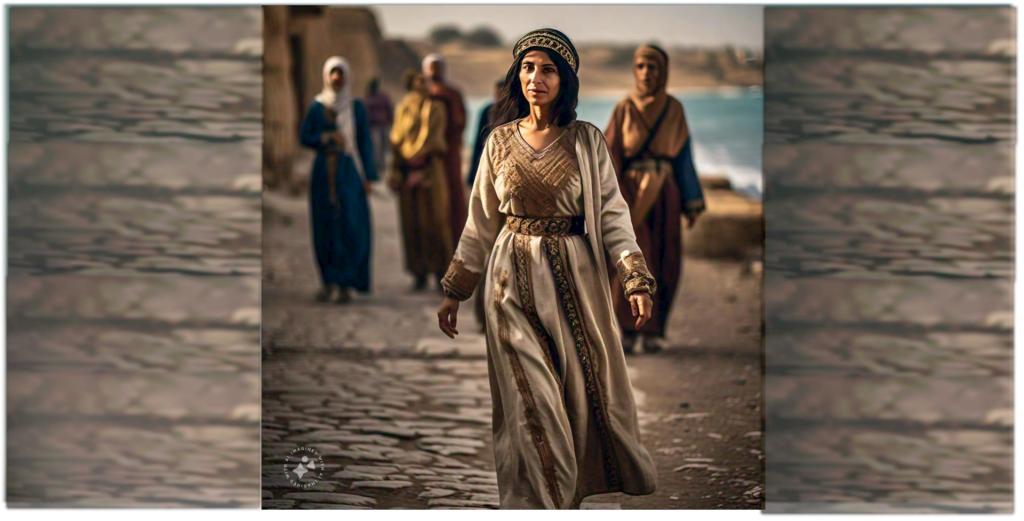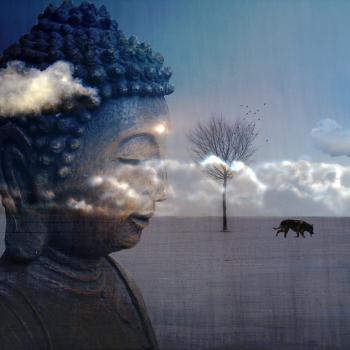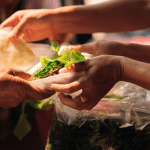What did Jesus really teach? It’s difficult to know except through the twelve apostles, because the first five books of the New Testament are about Jesus’ mission to the Jews, not to non-Jews. Similarities and significant differences exist. Forgiveness and love are the uniting themes. One way of exploring this is fiction based on fact. Storytelling is something I do, with over 20 fiction and nonfiction books available (see the end notes).
Based on fact: This is what stories are called when they blend fiction with fact. It’s a common way of creating a story, such as in the Left Behind apocalyptic rapture series, that fantasizes about an interpretation known as pre-millennialism. It takes presumed Biblical interpretation and creates stories around it.
See the copyright notice at the end about On the Road Christianity.
On the Road Christianity
Chapter 1: God is Impartial and loves all

Judith thought she recognized a woman on the road. Her fatigue may have influenced her perception. Her fatigue was a combination of the stress of leaving her home and the unfamiliarity of walking. She might never see her home again. Age might play a part too. She was fifty. The goodbyes took longer than expected, so she didn’t start the fifteen-mile journey until late afternoon, and she walked late into the evening.
The road from Ptolemais in Galilee to Tyre was a long, hot journey with little relief for weary travelers. She had planned to reach her sister’s home by nightfall to avoid the plague of bandits who preyed on single travelers. Nightfall was especially dangerous.
People inquired why she would leave such a peaceful place as Ptolemais. It was not peaceful. Non-Jews were in the majority in Galilee, but some zealot Jews, who had formed a movement from spurious resistance to the Romans, kept everyone in a panic state. Their goal was obvious. Seize all territory for the Jews and kick out the Romans.
The Romans were everywhere. They said they were keeping the peace, but their armaments said differently. They antagonized everyone, especially the Jews. Their presence brought fear mixed with less crime. Peace at an ugly price.
The ancient port at Ptolemais was being improved and fortified by the Romans. Traders said the Romans planned to attack the Jews and put an end to the Zealots’ revolt. Traders always traded in rumors, but it seemed the Jewish Zealots couldn’t coexist harmoniously with the Romans, as the Jews had lived with foreign domination for centuries. She didn’t want to live in a war zone. War brought death even to those not involved. Tyre was safer because it had fewer Jews, so less Zealots.
Without her husband and with her sons away as traders, she relocated to Tyre to live with her sister.
She was proud of her sons. The Greeks and Romans developed Sepphoris as a major trading center in a Jewish-dominated area of Galilee. Her sons always had a surplus of fish in their catch, which they traded for other goods. So once a week they took goods to Sepphoris to trade. Soon they were trading many things, and then they became traders who went as far north as Asia Minor (modern Turkey) to get goods.
Her oldest son legally owned her home by birthright inheritance. She told both of her sons to live there with their wives. Although she might never return, she knew she would always have a home there.
Judith looked at the woman ahead of her she thought she recognized. She looked weary. Perhaps she would stop soon, and the small group she was with.
The Romans improved the road along the sea from a dirt path to cobblestone. The stones varied from flat to lumpy, and were always hot, making walking difficult. Occasional carts carrying goods or soldiers rumbled by over the cobblestones, their passengers getting an endless jostling. Often, she walked on the ground beside the road. Ancient roads in the region were mere dirt paths. Dirt paths had their advantages unless it rained. Except for snakes. She hated snakes. And scorpions.
As she walked, a nagging question kept at her. A man called Jesus had once visited the area around ten years ago. He was a Jew, but he was very nice to everyone. He came intentionally to Galilee. Some said he was from nearby Nazareth. Some said he was a prophet sent from God.
Unlike most Jews, he seemed to have high regard for women and spoke to them as if they were intelligent. He spoke like one in authority and did miracles. Of course, fake miracles could deceive people. There was a lot of that going around. But sincerity was difficult to fake, and he asked for nothing in return. She would like to have seen him again. She had so many questions, but people said that the Romans killed him.
The Egyptians had started Ptolemais, but their religion was vague. The surrounding area worshipped Ba’al. Baal was a Canaanite god worshipped as the sun god, storm god, and fertility god. It was similar to the Hellenist religious influences of Zeus, who acted more like people than gods you could depend on. The Romans made their leaders gods. The Jews had an exclusive religion that not even the Samaritans could use, even though they believed the same things, just not the prophets. It was incredibly confusing.
Some said there was a Jewish-Christian group settled in Ptolemais, but she didn’t feel comfortable approaching them. But she had liked Jesus. He was very approachable.
Jesus spoke like he knew God. He accepted all others. He talked about The Way to live that God approved. It resonated with her. It sounded right.
Dusk was approaching and she would have to find shelter. Sleeping in the open made you an open target. Other travelers usually let her travel and sleep with them on previous journeys. Traders had regular places they stopped for the night, but they might steal from you in the night and leave before you awoke. Travel was treacherous.
She would take advantage of the hospitality of those living by the road, but she knew their hospitality had worn thin from frequent travelers on this busy road. Hospitality to travelers was a Middle Eastern requirement, but they were unlikely to answer their doors.
The woman she thought she recognized stepped off the road. She was traveling with three others, two men and another woman. The woman placed her bags on the ground and collapsed in a heap, then gradually unfolded onto the ground. She heard her sigh heavily. The other three squatted next to her and began undoing their bags of essential items.
Judith dared go near their makeshift camp. They could be friend or foe. They could be inhospitable. She had enough bread, dried meat, dried fruit, and wine for the journey, but they might take all of it. Even if she only shared, she would not have enough.
She stood outside the camp and timidly waved to the group. The other woman smiled, waved back, and motioned her to join them. She ventured in.
“I’m Sharon. What’s your name?” she asked amiably.
“Judith. I’m traveling to my sister’s home in Tyre.”
“Welcome,” Sharon said. “Please join us. When we have rested some and washed, we’ll have some food.”
“Thank-you,” Judith gushed. She moved forward and set her bag down.
“Do you have food?’ Sharon asked.
“A little.” Judith didn’t want to reveal too much until she knew if they had their own food and could be trusted.
“There is always enough,” Sharon said. The others nodded in agreement.
Judith collapsed into a well-worn pocket in the ground where other travelers had found rest before. Small sticks and leaves covered it. She leaned back against the large stone that protected the nest and rested her head against it. She said very little for several minutes.
One man scavenged for water and wood while the other made a campfire from weeds, grass, and a few sticks he found nearby. He struck flint against steel to create sparks in the weeds. Sharon unwrapped some food from a cloth and placed the cloth on the ground.
“I’m amazed at your energy after such a long journey,” Judith said to Sharon.
“It helps walking with a group and being jovial. Lifting our spirit gives us energy,” Sharon replied. Then she looked at Rachel on the ground. “Well, some of us.”
Rachel sat up. “I’ll do my part.”
“Where are you going?” Judith asked.
“Sidon,” Rachel replied. We’re creating a … community there.”
“Trading community?” Judith asked. Currently, there was a continuous influx of new items for trading. The Romans were huge buyers, and once they created a market, others discovered the new products.
“No, we just want peace.”
“Me, too.” Judith smiled at them. They seemed like peaceful people.
“I thought I recognized you. Did you ever visit Ptolemais? Maybe with a man named Jesus?”
Rachel looked at the others. They considered her question for a moment, then nodded to Rachel. “Yes,” she said without elaborating.
Judith thought they seemed guarded about Jesus, but continued with enthusiasm, “He’s a Jew, but he came to us and talked as if he accepted us. He did miracles.”
“Yes, he did,” Rachel said.
“I wanted to know more about him. But I think the Jews will keep him all to themselves just as they do all Jewish things.”
The men chuckled to themselves as if at some inside joke. Rachel replied, “We’re Jews, but we follow Jesus. We’re followers of The Way, and we want you to know more about him. That’s our purpose.”
Judith gulped. “You’re Jews and you’re talking to me, an outsider to your religion? Isn’t that illegal in your tradition?”
Sharon giggled. “Jesus taught us to love everyone. All people are the same to God. Jesus said to us, ‘There is neither Jew nor Greek, there is neither slave nor free man, there is neither male nor female; for you are all one in Christ Jesus.’ (Galatians 3:28).
One man said, Jesus taught there is no partiality with God. (Romans 2:11). We divide the world into groups that God never created. God loves everyone equally and without favoritism, and this love is unconditional. This is God’s character. Only men try to change God’s character with their divisions. (John 3:16, 1 John 4:8, 16)
“Then are the Jews the favored people of God?” Judith asked.
“We have been, and perhaps we still are. Time will tell. But favor means that we are asked to do more, not that something given to us.”
The other man, Simon, said, “Paul thinks Jesus’ followers are now the chosen ones.”
“Paul exaggerates to make his points,” Rachel said frankly. “And he tries to connect everything to Judaism. God is impartial.”
Sharon stated, “Followers of The Way have a new covenant with God, but its meaning is unclear to us.”
Judith marveled the women seemed as informed about religious matters as the men. How could this be among Jews? Was God truly this impartial?
A man returned with a waterskin full of water. The others smiled appreciatively at him. He said, “Now I know why people stop to rest here. There is a stream nearby.”
The group lined up, and he poured water on their hands and feet. Judith hung back.
The man looked at her. “Now, what kind of people would we be if we excluded you?” He beckoned her forward.
She embraced the water as it cascaded over her hands and feet, cooling and cleansing.
“Thank-you John.” Sharon said. She held the waterskin while he bathed. Then, his work done, he laid down on a mat. “Supper John,” Sharon reminded him. He didn’t move.
Sharon turned to Judith. “Please, join us.”
“I have my own.”
Sharon smiled. “We bring enough for strangers. Please give us the privilege of joining us.”
Judith couldn’t believe her good fortune. These were especially good people. Jews were always good to other Jews, but not to others. These followers of Jesus were special. She munched on some dried figs from their spread, laid her blanket in the recess and wrapped it around her, closed her eyes, and was soon asleep.
Chapter 2 next week.
__________________________
– Dorian
Copyright notice: On the Road Christianity, Copyright © 2024 by Dorian Scott Cole. Congregations can read this on Patheos or in groups, but you cannot include this in other works or collections in any publishing format including electronic forms. Others cannot sell this story or include it in collections.
Our answer is God. God’s answer is us. Together we make the world better.
Restore and recreate. Take time to celebrate life. Laugh, sing, and dance regularly, even every day. Happy.
Bible scripture verses are New American Standard Version (NASB), unless noted.
Author and books
Appease the Volcano: What does God require from people? The voices of the ancients from many religions echo much of the same things: It starts with law, then mercy and forgiveness, then love.
The Prophetic Pattern: Ancient and Modern Prophecy: How to distinguish the intent of various types of prophecies and oracles, both ancient and modern.
Preparing For the Future Of Work and Education: Analysis of the kinds of jobs that AI and Robotics will displace, and the educational requirements for them. AI will replace or augment thirty percent of jobs. This is an in-depth analysis citing many authoritative sources.
Author Website: Dorian Scott Cole
















